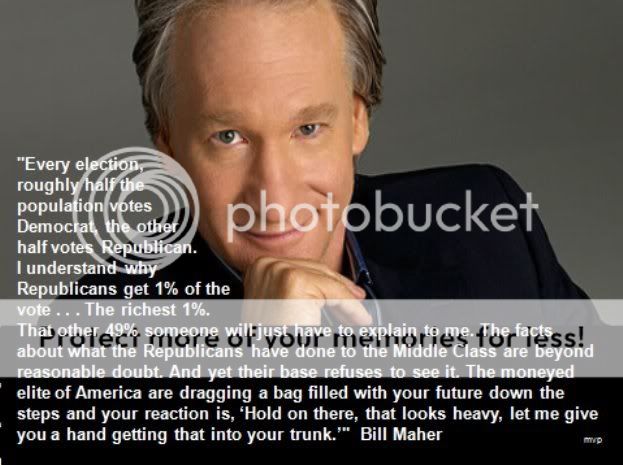I really would love to know why people would vote against their own best interests.
I think this is a fair question, so I will take a stab at it.
First, I'm going to speak in broad generalizations. I am going to assume Maher's statement in the OP is representative of broad liberal thinking. It may, or it may not, I don't know. But I think it does, though it may not apply for any one specific individual. As a precursor, on many topics, I could say lots of nice things about liberals, so please don't make the assumption that I'm taking broad shots at liberals.
I'm a foreigner in this country, and it took me about a decade to understand American mythology. Now I don't use the term "mythology" in the pejorative sense, but rather defined as a basic narrative which nations and peoples define themselves. The core of mythology are basic truths but often wrapped with contradictions. All nations have them. America is no different. America has its own mythology and ideals.
The basic mythology is that the individual is sovereign. This is what defines America to me. Throughout most of the world, the individual is not sovereign. Sovereignty is conferred from elsewhere, i.e. in the British Commonwealth, it comes from the Queen or King. In America, it comes from the individual.
In the conservative line of thinking, sovereignty of the individual means the absence of government intervention in people's lives. If you believe in the ideal that the individual is sovereign, then it is
not in the best interests of the middle class to more heavily tax and regulate the rich to their benefit. Instead, the best interests of the middle class in this framework is for the government to stay out of people's lives - all of people's lives - and not engage in socioeconomic engineering. In this framework, the middle class doesn't want the government to transfer wealth from the rich to them because it contradicts their perception of the American ideal.
A lot of non-Americans don't understand this. There was a poll done by the Pew Foundation a few years ago which asked people in the United States and Europe this question (or something along those lines): What is more important to you, economic security or freedom from government interference. In Europe, people answered two-thirds economic security, one-third freedom from government interference. In America, it was completely flipped. My guess is that liberals would tend to agree more with Europeans.
Even social programs in the United States are heavily weighted towards the middle class whereas in most other countries, they are weighted towards the poor. Though social programs are a contradiction of the American ideal - even popular programs such as Medicare and Social Security - it is not inconsistent with the middle classes essentially transferring wealth from themselves to themselves.
It is my observation - and again, I may be wrong - that many liberals like Bill Maher don't understand this either. Rather, they see it all as a zero sum game, or at least a conflict between the different classes. Conservatives instead see everyone as individuals regardless of their income class. So liberals like Maher view the world through a spectrum that perceives the interests of the middle class to be separate from the wealthy, to which conservatives vehemently disagree. Conservatives argue it is the same - freedom from government intervention in people's lives. And because of this, liberals like Maher fail to understand the American ideal held by so many people.
But like I said, maybe I'm wrong.
I'm sure my day will come. I'm finding it hard to quake, mind you, but it will come.


 You're a liberal true but you'll vote obama as usual.
You're a liberal true but you'll vote obama as usual.
